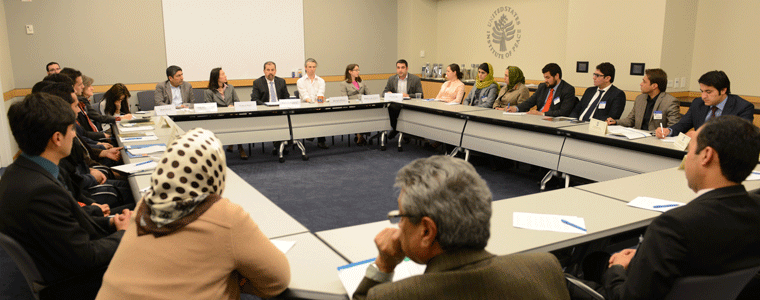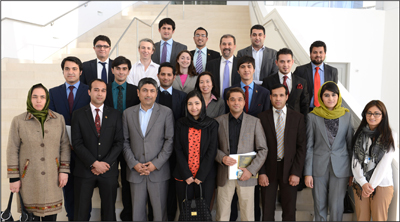Afghan diplomats preparing to help steer their country’s foreign policy heard messages of support along with encouragement toward self-reliance during a stop at the U.S. Institute of Peace (USIP) on December 5. The session was aimed at briefing them on the array of USIP programs centered on their country as the United States turns over more responsibility to the government of Afghanistan.

Afghan diplomats preparing to help steer their country’s foreign policy heard messages of support along with encouragement toward self-reliance during a stop at the U.S. Institute of Peace (USIP) on December 5. The session was aimed at briefing them on the array of USIP programs centered on their country as the United States turns over more responsibility to the government of Afghanistan.
The briefing was part of a two-week visit to Washington in a training program organized by the U.S. and Chinese embassies in Kabul. The 15 diplomats were selected jointly by the embassies, and the group took part in May in a similar two-week program in Beijing with the Chinese Ministry of Foreign Affairs. Meridian International Center in Washington, in partnership with the Public Diplomacy Council, developed the program for the U.S. visit.
The training of Afghan diplomats takes on particular urgency as the U.S. and its allies in the NATO-led coalition prepare to withdraw most of their troops by the end of 2014. Enduring stability will require not only the country’s own military and police forces to step in but also an effective civilian cadre in government to negotiate foreign relations in a way that ensures support for Afghanistan’s political and economic future.

Afghan diplomats and U.S. Institute of Peace staff at USIP on December 5, 2012
The diplomats, including three women, asked USIP experts for thoughts on how Afghanistan can address political and economic issues facing their country and what help the U.S., other nations and organizations such as USIP are likely to provide after 2014.
“I know the Afghan people are extremely worried and concerned,” Omar Samad, a former Afghan ambassador who currently serves as Afghanistan Senior Expert in Residence with USIP’s Center for Conflict Management, told the participants. The U.S. and its allies have pledged at least $4 billion a year to support the Afghan security forces and $16 billion over four years to help support Afghanistan’s economy, he said.
“But it also means that the responsibility now is shifted almost entirely onto Afghan shoulders, because it is our country, it’s our future,” Samad said. “It’s up to us to make it happen. For that to happen, we have to have the proper political setup.”
USIP has worked in Afghanistan since 2004 at multiple levels with local partner organizations, including establishing a field office in 2008, said Barmak Pazhwak, senior program officer in USIP’s Grant Program and a former adviser to the Afghan government for the United Nations Development Program. He cited training to build peace at the village level and policy recommendations to the U.S. government on issues related to Afghanistan. In Washington, USIP hosted President Hamid Karzai in 2010, and more recently the chairman of Afghanistan’s Independent Election Commission, as well as a delegation of the country’s High Peace Council and Deputy Foreign Minister Jawed Ludin, Pazhwak said.
One of the topics on the minds of the diplomats in the December 5 group was Afghanistan’s future economic prospects. Pazhwak said that will be among the responsibilities the Afghan government will have to take on. In addition to the planned foreign assistance, “Afghanistan has to rely on its own revenue, improve its taxation system and fight corruption,” Pazhwak said.
“These are questions that really depend on the capability and the will of the Afghan government,” Pazhwak told the group.
Other USIP experts who briefed the Afghan diplomats were Marcia Wong, director for Intergovernmental Affairs; Michael Dwyer, senior program officer on Media, Conflict and Peacebuilding; Hodei Sultan, program officer for Afghanistan and Pakistan; Attaullah Nasib, program assistant for the Rule of Law Center on Afghanistan ; and Rebecca Kullman, program specialist in the Center for Sustainable Economies.
Statistics show that 54 percent of Afghanistan’s population is under the age of 19, Dwyer told the group. “Some pretty dramatic changes are going to happen in Afghanistan over the next decade or two, as your generation moves into increasing positions of authority and influence, he said. So USIP helps with broadcast and other media projects to reach that group and also to extend the discussion of Afghanistan’s future beyond the capital Kabul.
One of the visiting women formerly worked for Afghanistan’s election commission and now concentrates on human rights and gender issues in the Foreign Ministry. She said she particularly noted USIP’s support for the participation of women in the political process and especially the parliamentary elections due in 2015. “It’s so interesting for me because I worked for women candidates for Parliament and also for women’s participation in the elections,” she said after the session. The Embassy of Afghanistan requested the envoys in training not be identified by name.
USIP plans to continue its work on gender and peacebuilding with Afghan civil society and young Afghan women and men in advance of the next round of elections, which starts with presidential balloting in 2014, to raise awareness of civic participation, the Institute’s Sultan told the group.
“We look to people such as yourself to give us guidance on what’s really important, what’s really necessary, so we’re not kind of implementing things from the top down,” Sultan said.